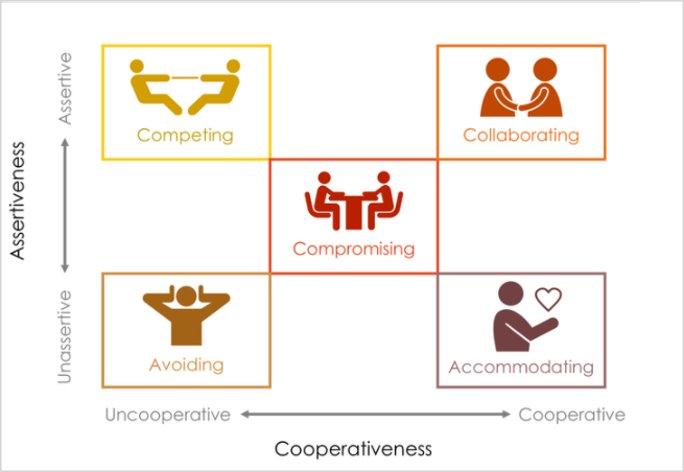When it comes to conflict, many people would agree with the axiom, “Stop reacting and start responding!”
This seems like a universal principle, but most leaders don't know how to actually do that. Here are three concepts to help you stop reacting to conflict and start responding appropriately. If you understand these concepts, you will be more productive in helping your team to resolve conflict.
Styles
The first area in conflict to be aware of is “styles.” Thomas Kilmann created what is commonly referred to as the Conflict Management Style. He talks about those that are competing, avoiding, collaborating, accommodating, or compromising. And all of that is on an axis of assertiveness vs. cooperativeness.
It is important that people understand their default conflict style. There are lots of resources and assessments to help you with this. But just knowing your style doesn't often help you to regulate when your tendency might be to react.
Roles
The second element is “roles.” Stephen Karpman put together what is commonly referred to as the Drama Triangle. Like any good story or drama, there is always a victim, a persecutor, and a rescuer. And those roles can switch. Sometimes the person that is the rescuer becomes the persecutor of the person who was persecuting the victim! And it goes around and around. It is helpful to know your default style, but it is also helpful to know what role you might be in during a particular conflict. The key here is: get out of the role, solve the problem.
Responses
The third area has to do with “responses.” Think in terms of reading the messaging that is coming from a person. Now, their style might play a part, or their role may play a part, but overall, listen to what they are saying. As the manager, active listening goes a long way to understanding how to respond to what a team member needs.
On the chart above, you have an axis point of task vs. people. Then on the other side, you have someone who wants to stabilize/respond to their context vs. someone who wants to change/shape the context. People will fall somewhere on these scales. It is a continuum, so no one is purely one thing or another. Try not to assign labels to people, but instead, read their behavior in the environment.
How your team members react:
Manage: If a person is high task-focused and trying to change the environment, they are likely going to want to manage something.
Motivate: If they are people-focused and want to change the environment, they will often try to motivate or inspire.
Mollify: If someone is people-focused but also on the stabilization side, they are going to mollify, which simply means to calm, to stabilize, or to ensure safety.
Mandate: If you have someone who is focused on high task and high stability, they will want mandates. These are people that will want to respond to data and want to create policies.
How to respond to the reactions:
So, what do you do as a manager when someone comes to you and they are having a conflict? By the premise we laid at the beginning, you don’t want to react. You want to listen to what they’re saying and respond accordingly to give them what they need.
When they are trying to Manage: If someone comes to you agitated, excited, or upset about something in a task area, and they want to change something, what do you do? You add responsibility to them. Don’t squash, stifle, or try to micromanage them. Let them try to manage some of those things. They have the natural energy and passion to do so.
When they are trying to Motivate: If someone comes to you excited about how to develop people and they want to change something about the rules and regulations, go ahead and get excited with them. Lean into them. Hear what they are saying. Do they have the interest of other people involved? Commend them for that. Don't stifle or squash them using policies or other mandates that you might give as a manager.
When they are trying to Mollify: If someone comes to you concerned about a policy or a principle that might be affecting others negatively, what should you do? Show sympathy. Think of it as emotional intelligence. Listen carefully, understand where they're coming from, and do not pressure them. People on this side of the quadrant don't want to be rushed. Those that want to change the environment tend to want to do it fast. But this person wants to know if you have a heart for the people as well as for making sure that policy is upheld.
When they are trying to Mandate: Finally, you have people who want to mandate change. They come to you with stacks of data or some policy has been violated and they want to keep people accountable. What do you do in those situations? Encourage them and permit them to do some analysis. Data can be very helpful. Data doesn’t always solve conflict, but it does establish a factual basis. Don’t dismiss the data, and don't become the person that says, “I'm blind to what the data says. We’re into groupthink here.” Don't do that.
What can we learn from all of this? “The wise respond. The foolish react. The wise think and then act. The foolish act and then regret.” – The Regreter. That's actually an anonymous quote, but I put “The Regretter” because we have all been there.
So, as you face conflict, I challenge you to think through the following questions:
What style is in play here? What is the default personality, temperament, or response to conflict?
What role has been assigned to you and to them? Are they the victim or the persecutor? Or are you now the hero all of a sudden?
Make sure you're responding to what people are saying. What is the behavior telling you so that you can respond uniquely and appropriately as a manager?
Contact us for more information on how our coaches can help you learn how to manage conflict more effectively and create a positive team culture.
For more information on managing conflict, check our our video Conflict: How to Fight Right.
Dave Marks is a Senior Consultant at The Center Consulting Group and has over 35 years of church ministry experience including 23 years as a senior pastor. His consulting experience includes ministry assessment, leadership coaching, and strategic planning. Dave’s degrees include a B.S. in Bible, an M.S. in Organizational Leadership and a D.Min. in Leadership.







![Conflict: The Importance of Having Tough Conversations [VIDEO]](https://images.squarespace-cdn.com/content/v1/571fc0ea1d07c0fd6d72c167/1741365599296-KTWEJ5PTNH1BX2GJ9REJ/Conversations+blog.png)
![Exit Planning: The Challenge of Business Exit Planning & Why It Matters to You [VIDEO]](https://images.squarespace-cdn.com/content/v1/571fc0ea1d07c0fd6d72c167/1738339040891-VIW87N2NCZUCKLYNOHB6/exit+blog.png)

![Teams: Is Your Team Dysfunctional? [VIDEO]](https://images.squarespace-cdn.com/content/v1/571fc0ea1d07c0fd6d72c167/1733243870005-NOI69Z74DLNVLIB8MRRJ/dysfunctional+blog.png)
![How to Recruit and Inspire Volunteers [VIDEO]](https://images.squarespace-cdn.com/content/v1/571fc0ea1d07c0fd6d72c167/1728421227208-6JAUFVXEJW5KK6YE58JR/volunteers+blog.png)
![Trust: 4 Steps to Rebuild Damaged Trust [VIDEO]](https://images.squarespace-cdn.com/content/v1/571fc0ea1d07c0fd6d72c167/1725969594417-7AN9PJO2X8TTR77ACDFP/trust+blog.png)
![Blind Spots: How to Identify & Avoid Blind Spots in Your Organization [VIDEO]](https://images.squarespace-cdn.com/content/v1/571fc0ea1d07c0fd6d72c167/1722610352594-FAXECLPC61QYJH2I5YT8/blind+spot+blog.png)
![Family Business: Will the Family Business Destroy Our Family? [VIDEO]](https://images.squarespace-cdn.com/content/v1/571fc0ea1d07c0fd6d72c167/1718027719043-MU9AYPTQ7GM4XWT9EGD1/destroy+blog.png)
![Teams: How to Breathe New Life into a Broken Team [VIDEO]](https://images.squarespace-cdn.com/content/v1/571fc0ea1d07c0fd6d72c167/1714749389916-G2CWVK8OM1JJSD9058CL/breathe+blog.png)
![Planning: The Power of Planning [VIDEO]](https://images.squarespace-cdn.com/content/v1/571fc0ea1d07c0fd6d72c167/1712597764732-WHRZPRLZ6V78CBGKBPZA/PLanning+blog.png)
![Leveling Up Your Leadership: Becoming an Effective Senior Leader [VIDEO]](https://images.squarespace-cdn.com/content/v1/571fc0ea1d07c0fd6d72c167/1710266273593-QN3HEBJ5FII4GKQFH91Q/leveling+up+blog.png)
![Recruiting & Retaining “Mature” Team Members [VIDEO]](https://images.squarespace-cdn.com/content/v1/571fc0ea1d07c0fd6d72c167/1707849950823-Y5WJLYXM6ZPU55TKG27Y/recruitment+blog.png)

![Gaslighting: How to Identify It & Take Back Control [VIDEO]](https://images.squarespace-cdn.com/content/v1/571fc0ea1d07c0fd6d72c167/1699381799669-Y6XNYG2X3ZD1US80XAFY/Gaslighting+blog.png)
![Decision-Making: Why Smart Leaders Do Dumb Things [VIDEO]](https://images.squarespace-cdn.com/content/v1/571fc0ea1d07c0fd6d72c167/1696947285846-ZIA5M26B5AF9SRFGWFPV/Dumb+Things+blog.png)

![Meeting Effectiveness: 4 Different Types of Meetings & Why It Matters [VIDEO]](https://images.squarespace-cdn.com/content/v1/571fc0ea1d07c0fd6d72c167/1690296011536-23CWWE2VJ40QJ0UA1EZY/meetings+blog.png)
![Leadership: 4 Directions You Need to Lead [VIDEO]](https://images.squarespace-cdn.com/content/v1/571fc0ea1d07c0fd6d72c167/1689105063370-WQTIN47T3TP8YXQM3RMP/directions+blog.png)
![Leadership Model: Are You a Cheerleader, Drill Sergeant, or Coach? [VIDEO]](https://images.squarespace-cdn.com/content/v1/571fc0ea1d07c0fd6d72c167/1686670057921-DJ286QE8OZOQKE22SZAL/coach+blog.png)
![Developing Women Leaders: The Power of Leader Efficacy [VIDEO]](https://images.squarespace-cdn.com/content/v1/571fc0ea1d07c0fd6d72c167/1683572272369-EJ4N7BBXL0832YUM4XUN/Women+efficacy+blog.png)


![Innovation: How To Make Innovation Part of Your Leadership [VIDEO]](https://images.squarespace-cdn.com/content/v1/571fc0ea1d07c0fd6d72c167/1675365017628-0ZAPR2WCAM23JVDHM34I/Innovation+blog.png)
![Civil Discourse Part 2: 3 Cognitive Skills to Help You Understand Different Perspectives [VIDEO]](https://images.squarespace-cdn.com/content/v1/571fc0ea1d07c0fd6d72c167/1673898642478-RKKE5JM6YMMKG460MCOD/Civil+Discourse+Cognitive+Skills+blog.png)
![Civil Discourse Part 1: 3 Emotional Skills to Engage With Those You May Not Agree With [VIDEO]](https://images.squarespace-cdn.com/content/v1/571fc0ea1d07c0fd6d72c167/1667851162605-2PANA7ZP4DAWH0WI7V3B/Civil+Discourse+Emotional+Skills+blog.png)
![Coaching: Leadership Coaching for High Performance [VIDEO]](https://images.squarespace-cdn.com/content/v1/571fc0ea1d07c0fd6d72c167/1665424350332-LKS9SEVB9T8ZPOOMVSAT/Coaching+blog.png)
![Family Legacies in the Workplace [VIDEO]](https://images.squarespace-cdn.com/content/v1/571fc0ea1d07c0fd6d72c167/1663246593252-EGUEIAVMWS491D6F9GK8/Family+Legacies+blog.png)


![Family Business: Stewarding a Family-Owned Business [VIDEO]](https://images.squarespace-cdn.com/content/v1/571fc0ea1d07c0fd6d72c167/1654202455905-AE4B60DC1JQUJASS9ENX/Stewarding+a+Family-Owned+Business+blog.png)